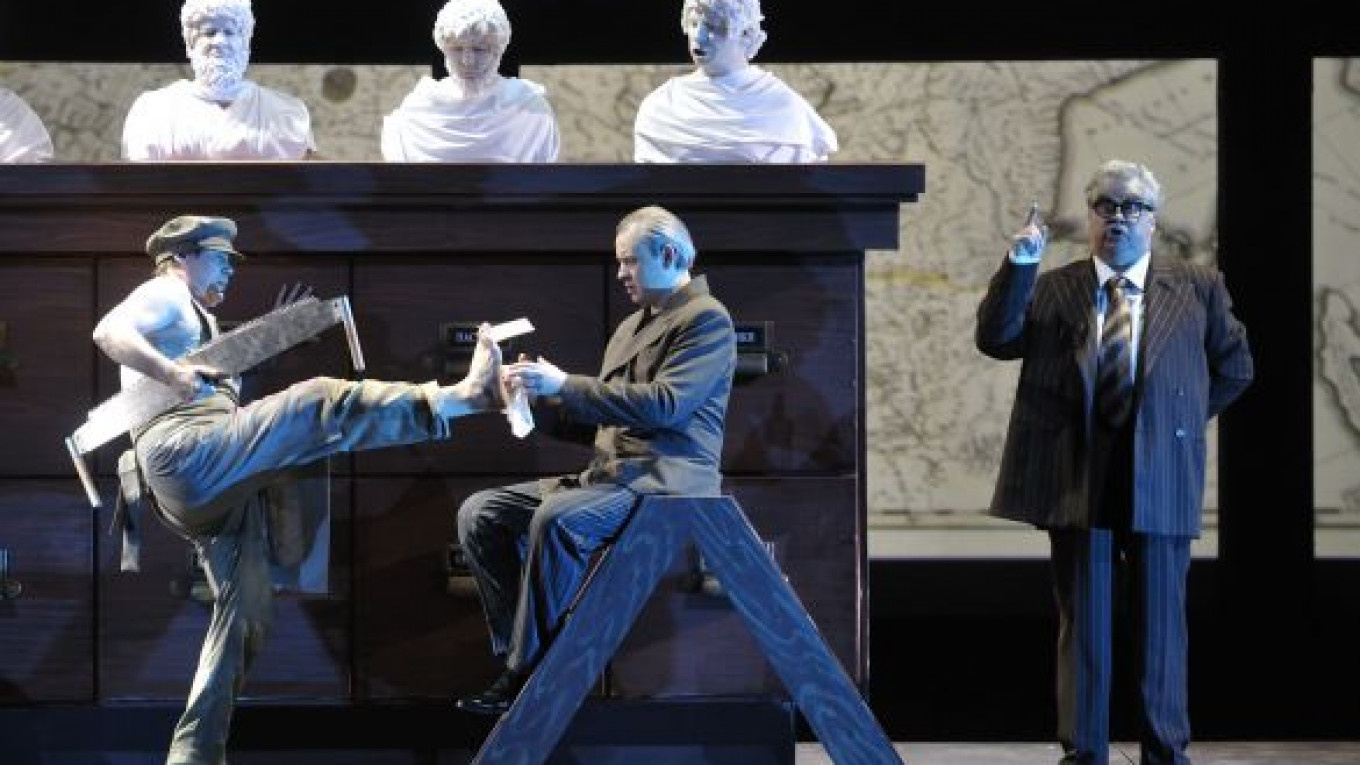ST. PETERSBURG — The Mariinsky Theater has triumphed again with a revival of Rodion Shchedrin’s 1978 opera “Dead Souls,” inspired by Nikolai Gogol’s legendary work.
The three-act opera makes use of the vocal resources of a substantial part of the company’s opera division — “Dead Souls” boasts a total of 32 characters with solo parts — and the production clearly inspired the members of the cast, as there was not a single weak vocal performance on the opening night on March 18.
Director Vasily Barkhatov and set designer Zinovy Margolin frame the stage for the production with a gigantic pair of wheels connected by a large vertical platform — the symbol of Pavel Chichikov’s travels between provincial estates seeking a good bargain for fictitious serfs (the premise of the novel’s plot is making money by using the names of serfs who have died but remained accounted for in property registers).
Barkhatov deliberately creates an eclectic mixture of styles and epochs in the opera. For example, the new production presents the dreamy Manilov couple as eccentric modern-day beekeepers, causing a good half of the audience to draw parallels with former Mayor Yury Luzhkov, a known bee-lover, and his wife Yelena Baturina. Korobochka (Larisa Dyadkova), in turn, is a classic 19th-century owner of a small sewing business: The only item that she makes is “white slippers” — what dead people get to wear at their funeral, as a popular Russian saying has it.
The gambler Nozdryov (Sergei Semishkur) is interpreted as a typical Russian nouveau riche at a drunken sauna party that gets out of hand, complete with female models wrapped in towels, picking up their lingerie in a hurry as they desert the place. No less entertaining is the sight of Sobakevich, who speaks to Chichikov from a podium, bearing a striking resemblance to a Soviet-era Communist Party official delivering an address.
Each of the vivid characters invented by Gogol enjoys what the composer describes as a “portrait aria,” and are also given a specific orchestral timbre and musical instrument by the composer. Manilov’s daydreaming is rendered by the flute, while the stingy Korobochka is represented by the bassoon. Nozdryov’s gambling spirit is delivered by the French horn, the pathetic Plyushkin is illustrated by the oboe, and rough Sobakevich by the double bass.
In Shchedrin’s opera, each act ends with an original orchestral episode featuring action but no singing. In keeping with the composer’s idea, the director makes good use of such pantomime throughout the staging.
It took the composer almost 10 years to complete the opera, which he based on one of his favorite novels. “Dead Souls” had its world premiere at the Mariinsky (which was then still known as the Kirov) Theater in 1978, when Yury Temirkanov was the principal conductor there. The opera has since been missing not only from the stage of the Mariinsky, but from the stages of most other Russian theaters, which have shown little appetite for the works of contemporary composers.
Valery Gergiev, the indefatigable artistic director of the Mariinsky Theater, seems to be a fan of Rodion Shchedrin. During the past five years, the company has given premieres of Shchedrin’s opera “The Enchanted Wanderer,” as well as of the ballets “Anna Karenina,” “The Little Humpbacked Horse” and “Carmen Suite.” The theater also offers a season ticket to a series titled “Shchedrin” that runs both at the theater itself and at the Mariinsky Theater Concert Hall and features the composer’s symphonic works, ballets and operas, including the ballets “Anna Karenina” and “Carmen Suite.” The company is also well rehearsed in Shchedrin’s symphonic works, which it regularly performs both at home and on tour.
Some critics have wondered what makes Gergiev choose Shchedrin over no less talented living counterparts such as Giya Kancheli or Sofia Gubaidulina, but the excellent production of “Dead Souls” is not one to doubt, as it is a must see for anyone who is even casually interested in the arts, be it opera, classical music or literature.
“Dead Souls” will next perform April 5 at 7 p.m. at the Mariinsky Theater, 1 Teatralnaya Ploshchad. St. Petersburg. Tel. (812) 326-4141, www.mariinsky.ru.
A Message from The Moscow Times:
Dear readers,
We are facing unprecedented challenges. Russia's Prosecutor General's Office has designated The Moscow Times as an "undesirable" organization, criminalizing our work and putting our staff at risk of prosecution. This follows our earlier unjust labeling as a "foreign agent."
These actions are direct attempts to silence independent journalism in Russia. The authorities claim our work "discredits the decisions of the Russian leadership." We see things differently: we strive to provide accurate, unbiased reporting on Russia.
We, the journalists of The Moscow Times, refuse to be silenced. But to continue our work, we need your help.
Your support, no matter how small, makes a world of difference. If you can, please support us monthly starting from just $2. It's quick to set up, and every contribution makes a significant impact.
By supporting The Moscow Times, you're defending open, independent journalism in the face of repression. Thank you for standing with us.
Remind me later.






